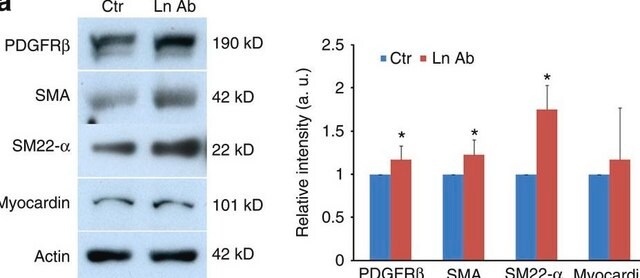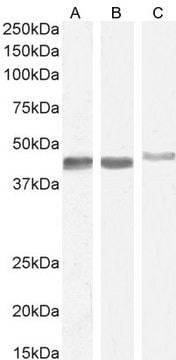We do not test this product for IF on cells. However, it has been used in this application. You can use a secondary antibody like Product No. Anti-Mouse IgG (Fab specific)-FITC antibody produced in goat.
A2547
Anti-actina, α-músculo liso monoclonal
clone 1A4, ascites fluid
Sinónimos:
SMA
Seleccione un Tamaño
Seleccione un Tamaño
About This Item
Productos recomendados
biological source
mouse
Quality Level
conjugate
unconjugated
antibody form
ascites fluid
antibody product type
primary antibodies
clone
1A4, monoclonal
mol wt
antigen ~42 kDa
contains
15 mM sodium azide
species reactivity
human, mouse, rat, chicken, frog, canine, rabbit, guinea pig, goat, bovine, sheep, snake
technique(s)
immunohistochemistry (formalin-fixed, paraffin-embedded sections): suitable using smooth muscle cells
immunohistochemistry (frozen sections): suitable using smooth muscle cells
indirect immunofluorescence: 1:400 using blood vessels in sections of human appendix
western blot: suitable using smooth muscle cells
isotype
IgG2a
UniProt accession no.
application(s)
research pathology
shipped in
dry ice
storage temp.
−20°C
target post-translational modification
unmodified
Gene Information
human ... ACTA2(59)
mouse ... Acta2(11475)
rat ... Acta2(81633)
¿Está buscando productos similares? Visita Guía de comparación de productos
Categorías relacionadas
General description
El anticuerpo monoclonal de ratón anti-α-actina de músculo liso se une a la actina de humanos, ratón, rata, bovinos, pollo, ranas, cabras, conejillos de indias, conejos, perros, ovejas y serpientes.
El anticuerpo monoclonal anti-α actina de músculo liso (isotipo IgG2a de ratón) se obtiene del hibridoma producido por la fusión de células de mieloma de ratón y esplenocitos de una ratón inmunizado. Se utilizó el decapéptido sintético NH2 terminal de la α-actina de músculo liso acoplado con hemocianina de lapa de ojo de cerradura (KLH) como inmunógeno. El isotipo se determinó utilizando el kit ImmunoTypeTM Sigma (Sigma Stock No. ISO-1) y mediante un inmunoanálisis de difusión doble utilizando reactivos de isotipado de anticuerpos monoclonales de ratón (Sigma nº de ISO-2).
Specificity
Immunogen
Application
El anticuerpo monoclonal anti-α-actina de músculo liso se ha utilizado en la detección de actina 2 en fibroblastos de mama utilizando tinción de inmunofluorescencia.
Se realizó análisis mediante IHC de tejido cardiaco de ratón teñido con x-gal utilizando el anticuerpo monoclonal primario anti-actina de músculo liso de ratón para identificar los miofibroblastos.
Biochem/physiol Actions
Mutaciones en la actina 2 se asocian con una disfunción de los músculos lisos de las arterias y están implicadas en ciertas coronariopatías. Mutaciones en ACTA2 contribuyen al desgarro y agrandamiento de la aorta en los aneurismas de la aorta torácica (TAAD).
Physical form
Storage and Stability
Other Notes
Disclaimer
¿No encuentra el producto adecuado?
Pruebe nuestro Herramienta de selección de productos.
related product
Storage Class
10 - Combustible liquids
wgk_germany
WGK 1
flash_point_f
Not applicable
flash_point_c
Not applicable
Elija entre una de las versiones más recientes:
Certificados de análisis (COA)
¿No ve la versión correcta?
Si necesita una versión concreta, puede buscar un certificado específico por el número de lote.
¿Ya tiene este producto?
Encuentre la documentación para los productos que ha comprado recientemente en la Biblioteca de documentos.
Los clientes también vieron
-
Does this antibody work for IF staining of cultured cells on a cover slip? What secondary would you recommend?
1 answer-
Helpful?
-
-
Which is the suggested concentration for IHC in FF tissue?
1 answer-
The recommended concentration will be listed on the lot-specific Certificate of Analysis. For example, lot 0000221557 has an optimum concentration of 1:800.
Please see the sample Certificate of Analysis for more information: https://www.sigmaaldrich.com/certificates/sapfs/PROD/sap/certificate_pdfs/COFA/Q14/A2547-.2ML0000246371.pdfHelpful?
-
-
What is the Department of Transportation shipping information for this product?
1 answer-
Transportation information can be found in Section 14 of the product's (M)SDS.To access the shipping information for this material, use the link on the product detail page for the product.
Helpful?
-
-
What is the molecular weight of actin, Products A2066 and A2547?
1 answer-
Actin has a molecular weight of 42 kDa.
Helpful?
-
-
Can Product A2547, Monoclonal Anti-Actin, α-Smooth Muscle antibody detect beta actin?
1 answer-
No, Product A2547, Monoclonal Anti-Actin, α-Smooth Muscle antibody will not cross react with beta actin.
Helpful?
-
-
Is there a protocol for using Product A2547, Monoclonal Anti-Actin, α-Smooth Muscle antibody produced in mouse, in immunohistochemistry?
1 answer-
This antibody is used in our Immunohistochemistry Kit, Product No. IMMH2.
Helpful?
-
-
What is the antibody concentration of Product A2547, Monoclonal Anti-Actin, α-Smooth Muscle antibody produced in mouse?
1 answer-
This antibody is ascities fluid. The amount of protein present and the amount of IgG1 present is indicated on the Lot-specific Certificate of Analysis.
Helpful?
-
-
Why do I have 3 bands on my western blot when using Product A2547, Monoclonal Anti-Actin, α-Smooth Muscle antibody produced in mouse?
1 answer-
While actin should run as a 42 kDa band when detected by Western blotting, there are recent observations that cleavage products can be seen in cells undergoing apoptosis. Initial cleavage gives a band at 41 kDa, which may appear as a doublet on the blot. In addition, further cleavage results in a major band at 30 kDa and a small band at 14 kDa which have been shown to be cleavage products due to the action of interleukin 1 -converting enzyme. This may explain the detection of smaller bands when blotting with this antibody. This banding pattern may be detected with other actin antibodies as well. Kayalar, C., et al., Proc. Natl. Acad. Sci., USA, 93:2234-2238, (1996).
Helpful?
-
Active Filters
Nuestro equipo de científicos tiene experiencia en todas las áreas de investigación: Ciencias de la vida, Ciencia de los materiales, Síntesis química, Cromatografía, Analítica y muchas otras.
Póngase en contacto con el Servicio técnico












